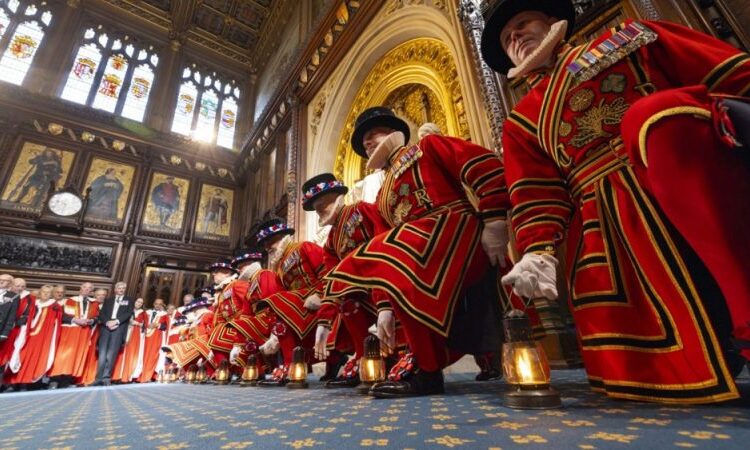
Hopes that Keir Starmer’s new Labour government will seek to rebuild closer ties with the EU gained momentum on Wednesday (17 July) as King Charles presented the incoming administration’s priorities at the House of Lords, with a focus on “resetting relations”.
While succinct, the language on restoring the country’s relations with Europe provided strong reassurance to those industries hoping to benefit from improved business terms between the two sides, after more than four years of post-Brexit tensions and regulatory divergence.
“My government will seek to reset relations with European partners and work to improve the UK’s trade and investment relationship with the European Union,” the King said.
Overall, the ceremonial King’s Speech – a long-lived British tradition that sees the legislative agenda of incoming governments being introduced by the monarch in a coordinated speech to the Parliament – yielded few surprises on Wednesday as Starmer’s pledges had been laid out clearly on numerous instances in recent months.
The latest of these was at the meeting of NATO members in Washington last week, where the new UK prime minister reiterated a strong focus on mending relations with Europe.
Meanwhile, Wednesday’s speech also signalled a heavy focus on economic reforms and growth – another widely pre-announced theme of Starmer’s policies for the next four years.
“Stability will be cornerstone of my government’s economic policy,” King Charles III said, adding that “every decision will be consistent with these fiscal rules: It will legislate to ensure that all significant tax or spending changes will be subject to independent assessment by the Office for Budget Responsibility.”
Economic policy plans laid out
The last Tory government before Rishi Sunak took over in 2022 made history as the shortest-lived administration as Prime Minister Liz Truss announced top-income-tier tax cuts not funded by any additional budget revenue, causing the pound to sink to historic lows and her tenure to come to a wrap after less than two months.
Meanwhile, King Charles said that “securing economic growth will be a fundamental mission” of the new government, which will “seek a new partnership with both businesses and working people, and help the country move on from the recent cost of living challenges by prioritising wealth creation for all communities”.
On this point, he signalled the new administration will focus on shaping “a new deal” for the labour force, “to ban exploitative practices and enhance employment rights”.
Moreover, he said, the Labour government will introduce bills to “strenghten audit and corporate governance alongside pension investment.”
Starmer’s government will also look to enact building and planning reforms , “seek[ing] to accelerate the delivery of high-quality infrastructure and housing”.
A long foretold rekindling
Post-Brexit economic relations with Europe, and the deals negotiated with European counterparts under the Brexit Withdrawal Bill, have been one of the key drivers of the failure of four consecutive Conservative governments since the June 2016 Leave vote.
Former prime minister Boris Johnson managed to finally pass a re-drafted withdrawal deal in early 2020, shortly after Theresa May resigned following three House of Commons rejections of her proposals due to internal Tory divisions on the bill.
However, Johnson’s harder-line Brexit agreements with Europe (part of which was set out under the so called Irish protocol, which scrapped the customs union with the EU) resulted in lower alignment on goods and services standards, and thereby more barriers to trade between the two blocs.
Starmer has vowed to revert this, starting from his party manifesto, which pledged to “tear down unnecessary barriers to trade”.
Earlier this month, in his first official visit to Scotland on 7 July, Starmer said: “I do think that we can get a much better deal than the botched deal that Boris Johnson saddled the U.K. with.”
On the same day, his Foreign Affairs Minister David Lammy published an article on the government website titled ‘It’s time to reset Britain’s relations with Europe’ before heading to opening trips to Germany, Poland, and Sweden.
Meanwhile, the new Minister for EU Relations Nick Thomas-Symonds visited Brussels on Monday (15 July) for talks with European Commission’s Executive Vice President Maroš Šefčovič.
This was accompanied by several bilateral talks between the two teams “to set the ground for further discussions between the UK and EU as the UK seeks to reset its relationship with the bloc and build closer cooperation on shared issues”.
European leaders will gather at Blenheim Palace in London on Thursday (18 July) for the European Political Community summit – an intergovernmental forum established in 2022 in the wake of Russia’s invasion of Ukraine – where, as Minister Lammy said in his European visits, “the new spirit of co-operation will be on show”.
[Edited by Zoran Radosavljevic]







